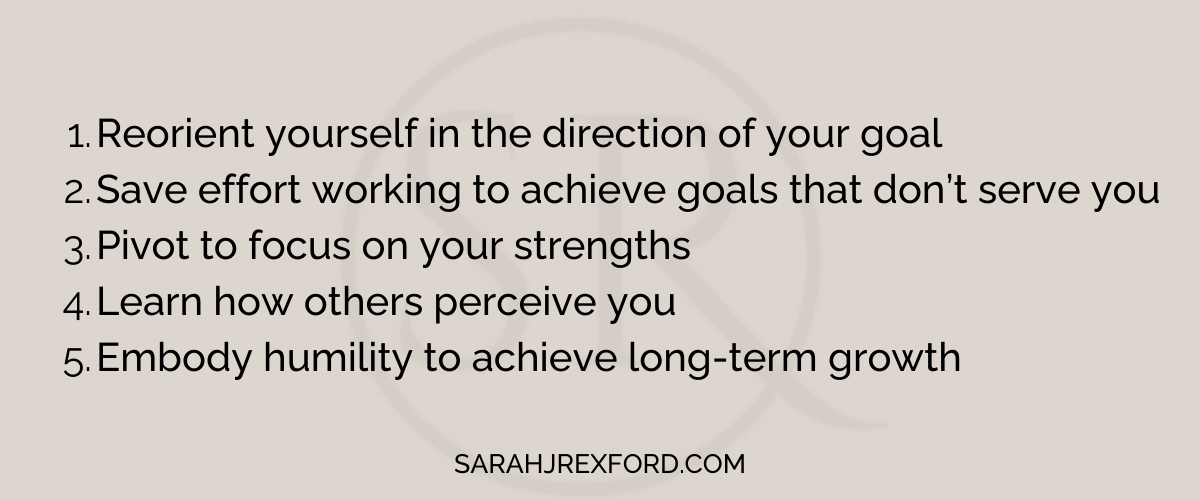5 Benefits Of Constructive Criticism: How To Embrace Your Growth
The benefits of constructive criticism are enormous, and while I have eight years of personal experience on the receiving end of criticism (more on that in a bit), the research speaks for itself.
Emotional intelligence (EI) has a key trait: the ability to accept constructive criticism. In Daniel Goleman’s must-read Harvard Business Review article, “What Makes a Leader,” he shared that company divisions with higher emotional intelligence (remember, the ability to accept constructive criticism plays a crucial role here), outperformed yearly earnings by 20%. That is significant growth.
Whether you are working toward a promotion at your company or want to become an author and start a writing career, we can’t ignore the effects of constructive criticism.
The benefits of accepting constructive criticism are life-changing, while the repercussions of ignoring it can destroy what could have been a flourishing career.
In this article, I list five benefits of constructive criticism so you can embrace your growth and live your dream. Before I explain the benefits of constructive criticism, let’s start with a definition.
Benefits of constructive criticism: what’s covered
What is constructive criticism and why is it important?
Constructive criticism is feedback given for the improvement of the one receiving it, and therefore, can take an individuals’ performance from good to great.
The following is a brief recap of me learning this the hard way.
When I first started my writing journey, I had no idea there were writing rules. An older mentor recommended I attend a writing conference, and only there did I begin to learn what I’m still learning today: how to write.
One evening session allowed conference attendees to sit down with faculty for feedback. The faculty members who read my work were extremely kind to young, high school me. They saw something I didn’t see in myself yet—a love for writing. I’m sure they also saw I had no idea what I was doing.
As I continued going to conferences, various individuals gave me constructive criticism on my writing. In fact, one editor told me that while I could get published, it might not be my first manuscript that got me there. Ouch. But he was right.
The benefits of the constructive criticism I received at these writing conferences taught me a valuable lesson. I didn’t know how to write, and I needed to learn.
Because professionals took time to honestly assess my work, they gave me the opportunity to see what I didn’t know. In doing so, they opened up an entirely new world for me. I began training under a New York Times bestselling author, learning countless writing tips, and today, have the extreme privilege of writing for a living. However, it’s not always easy to see the benefit of constructive criticism.
What are the 5 positive effects of criticism?
Embracing the benefits of constructive criticism can help you reach your goals in a much shorter time frame. How well you respond to criticism can drastically speed up the journey to your dream. So, how does constructive criticism help you?
1. Reorient yourself in the direction of your goal
The sooner you receive constructive criticism, the better, because it allows you the opportunity to pivot your strategy. Remember, when I was a new writer I didn’t realize there were writing goals. My goal was to publish my book.
It wasn’t until I began training in writing that I realized there was more to creative writing than knowing English grammar. Largely due to an outstanding mentor’s guidance, I reoriented my goal. Instead of “get published” my goal became “learn the writing rules.” Reorienting myself helped me focus on a new goal (learn to write). This new goal would raise the chance of me reaching my original goal (get published).
Tip: Maintaining a growth mindset is crucial to the success of your dream.
2. Save effort working to achieve goals that don’t serve you
Once again, the benefits of constructive criticism are profound due to the amount of time it can save you.
Long before I knew what I wanted to do (and by the way, do we ever fully know?), an older, and much wiser, individual told me he didn’t think my current career goals would work. Quickly, I asked him why. “Your personality doesn’t fit the industry, he said. “You wouldn’t like being told what to do all the time.” He knew I wanted to create original content, not be told what to create. He saw something in me I didn’t yet see in myself. I’m now on a different career path.
Early feedback can help you stop spending time working toward something you don’t want, and push you in the direction of what you do want.
3. Pivot to focus on your strengths
Research suggests that focusing on your strengths creates more long-term improvement than focusing on improving weaknesses.
In fact, one article put out by Yale states that when, “Individuals focus on strengths, they have a better chance at winning than if they focus on improving deficiencies.”
Maybe your natural proclivities lead you to write prose that sings, but you’re terrified of public speaking (many are) and spend most of your time trying to grow your social media following.
While today’s writers are responsible for marketing their works, consider spending more time on your writing than on overcoming your speaking fear. Grow your platform in other ways. You don’t need to be a keynote speaker to publish a book. Write prose readers can’t resist.
4. Learn how others perceive you
One advantage of constructive criticism is that it meets you exactly where you are. Many writers seeking to traditionally publish their books find hope when their rejection letters deviate from the norm. Most form rejections consist of something along the lines of, “This isn’t the right fit.” However, even difficult feedback can be helpful. “Your protagonist bored me,” reveals how the acquisitions editor perceived your story. If you here enough similar feedback from credible sources, consider updating your work.
I’ve found the benefits of constructive criticism, particularly from acquisitions editors, to work in my favor. Yes, rejection letters are still rejections, but is constructive criticism good? The answer depends on your mindset, which I discuss next.
5. Embody humility to achieve long-term growth
Without the presence of humility, it’s impossible to accept criticism, much less the benefits of constructive criticism. However, understanding that there is always more room to grow helps soften the sting of others pointing out areas for growth.
I repeatedly focus on the grit and growth mindset because I believe it’s the difference between those who make it and those who don’t. There are caveats to generalized statements, but overall, those who refuse to give up and pursue growth often work their dreams into reality.
Tip: Humility goes hand in hand with embracing constructive criticism, the path to long-term growth.
Why is it important to respond positively to constructive criticism?
Responding well to constructive criticism is crucial because criticism seems to have two effects: make individuals double-down on their current efforts or choose to consider areas for improvement. With constructive criticism, you must go in one direction or the other. It’s impossible to simply stay in one place.
First option: double down
When the editor at that writing conference told me I could publish a book, but likely not the one he was looking at, I thought, “I’m going to publish this book.” I doubled down because I wanted to prove I could do it. While it’s good to press on despite setbacks, this editor could see areas for growth I was too young and new to know existed.
Thankfully, doubling down taught me how much I didn’t know. Looking back, I realize how gracious he was to offer me feedback in such a kind way.
Second option: improve
The second response to constructive criticism is to take it as an opportunity to try something new. Rather than drive yourself into the ground trying to succeed in an area that will likely never be your strong suit, consider the endless opportunities before you.
Branching out into a new genre taught me how much I love writing dystopia. This is something I might have never learned if I refused to give up on my first manuscript. While writing my first book as a high schooler taught me a ton, the biggest lesson may have been that I didn’t know how to write.
Is constructive criticism a strength?
Constructive criticism is most definitely a strength in that it’s a fresh look at your work. In fact, how constructive criticism helps you improve can be so drastic that it turns your entire project around.
One of my early beta readers gave me feedback on my protagonist. Thankfully, by that point I knew it was important to at least consider the feedback I received. I changed my protagonist and that change is now one of the recurring factors readers talk about.
Why is constructive criticism important in writing?
Because a successful writing career hinges on the writer’s ability to improve, learning to work with constructive criticism is a core contributor. Just as new writers must learn how to get into a creative mindset even when they don’t feel inspired, successful authors must learn to use constructive criticism to their advantage.
Editors, by definition, make their living from offering constructive criticism. As an editor, it’s my job to help authors find areas for growth and capitalize on them as much as possible. (Sometimes, growing as a writer means sizing down.) I’ve also been on the receiving end: working with an editor who pointed out areas that were good, could improve, and should be cut. I had to decide whether to double down and reject her advice, or take it.
Growth is often uncomfortable, but if it was easy, there would be more bestselling authors.
Benefits of constructive criticism: take your next step today
Now that you know why constructive criticism is important, it’s time to get back to pursuing your dream. Access your free guide below so you can create your personalized, step-by-step plan to follow your dreams.




